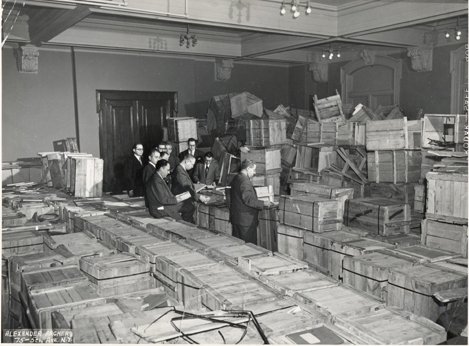
In January, the Lithuanian Central State Archive started preserving the documents collected by the Jewish scientific YIVO institute that operated in Vilnius between the two world wars to be able to later digitize them and upload on a special database on the Jewish life in Eastern Europe.
The work is conducted in the framework of a joint project with the YIVO institute, which currently operates in New York, and the Lithuanian National Library of Martynas Mažvydas, which will also place documents in their possession in the virtual library.
Some 10,000 rare and unique publications along with about 1.5 million documents related with the Jewish community, science, religion, education, culture and arts in Eastern Europe should be digitalized on both sides of the Atlantic over the period of seven years.
“The main idea is to merge what there is in New York and Lithuania to develop a digital document base. We have 44 meters of shelves of YIVO document. This will be the largest digital collection for Yiddish studies in Eastern Europe,” Lithuania’s Chief Archivist Ramojus Kraujelis said in an interview to BNS.
“The project shows how the country takes interest in its heritage, which does not have to be confined to Lithuanian issues only. Vilnius was once called the Jerusalem of the North, it was a centre of different cultures. This testifies to multi-culturalism and tolerance. We can contribute to the common history of the region, it is a small Lithuanian input to restoration of historic justice,” he said.
In Kraujelis’ words, the virtual library should provide document descriptions in both English and Lithuanian.
After the first Jews settled in Vilnius back in the 1500s, the city came to become a prominent Jewish spiritual and cultural centre, often dubbed the Lithuanian Jerusalem. Before World War II, Jews accounted for about a third of Vilnius population.
The YIVO institute that operated in Vilnius between 1925 and World War II researched Jewish life in all of Eastern Europe from Germany to Russia and from the Baltics to the Balkans. It collected Jewish folk art, memoirs, books and publications, documents of Jewish communities, published dictionaries, brochures and monographs. Dating back to the 1600s, many of the documents were written in Yiddish and Hebrew.
After occupying Vilnius and razing the institute to the ground in 1941, the Nazis took some of the archival books to Frankfurt. In 1946, the US army discovered the materials and transferred them to New York, which already accommodated the YIVO institute at the time.
After the war, the Soviets tried to destroy the remaining part of the archive that survived in the ruins as part of the Stalin campaign against the Jews. The unique documents were rescued by a Lithuanian librarian, Antanas Ulpis, who hid them in the Church of St. George in Vilnius. The books and the documents saw daylight again shortly before Lithuania regained independence from the Soviet Union in 1990.
When a BNS journalist visited the archive, specialists were working on a Yiddish-language transcript of Mirele Efros, a play by famous Yiddish playwright Jacob Gordin, in Latin characters. The copy was sent by a theatre in Russia to a censor in St. Petersburg about 100 years ago. The transcript features a red stamp of the YIVO theatre museum; however, it is still unclear who and when handed it to the museum.
“It is a well-known play that has been staged numerous times in various theatres in the interwar period. The transcript of the play was sent for censorship by a Russian imperial theatre that wanted to stage it,” historian Lara Lempertienė, working on the documents, told BNS.
There have been cases when parts of the same document are discovered in Vilnius and New York.
“Once in Vilnius, in the 1920s and 1930s, all these materials were together. They constituted a single whole that was torn apart first by the Nazis and then by the Soviets,” Jonathan Brent, executive director of the institute, said in a telephone interview to BNS from New York.
“What we are doing with the help of Lithuanian government and the Lithuanian institutions is to reunite these parts digitally. It will for the first time help the researches to understand the totality of what this experience was,” he said.
The digitalization project is estimated at about 5 million euros, with the funds generated by the New York-based institute from private and government sources. Lithuanian institutions have also pledged to contribute.
During World War II, Nazis and their Lithuanian collaborators massacred over 90 percent of Lithuania’s pre-war Jewish population of more than 200,000. About 3,000 Jews live in Lithuania today.
“The current project will allow revealing to both Lithuania and the world the rich and unique heritage of the Yiddish language, culture, literature and even Jewish traditional cuisine and make it accessible to generations to come,” the Lithuanian Jewish Community‘s leader Faina Kukliansky told BNS.

Be the first to comment